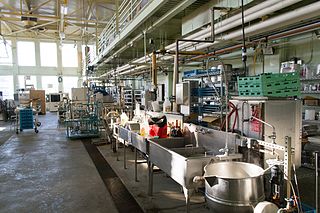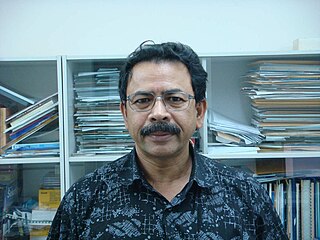
Food science is the basic science and applied science of food; its scope starts at overlap with agricultural science and nutritional science and leads through the scientific aspects of food safety and food processing, informing the development of food technology.
BioMed Central (BMC) is a United Kingdom-based, for-profit scientific open access publisher that produces over 250 scientific journals. All its journals are published online only. BioMed Central describes itself as the first and largest open access science publisher. It was founded in 2000 and has been owned by Springer, now Springer Nature, since 2008.

The American Society for Microbiology (ASM), originally the Society of American Bacteriologists, is a professional organization for scientists who study viruses, bacteria, fungi, algae, and protozoa as well as other aspects of microbiology. It was founded in 1899. The Society publishes a variety of scientific journals, textbooks, and other educational materials related to microbiology and infectious diseases. ASM organizes annual meetings, as well as workshops and professional development opportunities for its members.
The Institute for Scientific Information (ISI) was an academic publishing service, founded by Eugene Garfield in Philadelphia in 1956. ISI offered scientometric and bibliographic database services. Its specialty was citation indexing and analysis, a field pioneered by Garfield.

The Pseudomonadales are an order of Proteobacteria. A few members are opportunistic pathogens, such as species of Pseudomonas, Moraxella, and Acinetobacter, which may cause pneumonia.
G. Balakrish Nair is an Indian microbiologist. At present, he is the Ag. Regional Adviser, Research Policy and Cooperation Unit, Department of Communicable Diseases, World Health Organization. Before joining WHO, he was the Executive Director of Translational Health Science and Technology Institute (THSTI), Faridabad, NCR, India. Before joining THSTI, he was working in NICED as the Director. He has also served as the director of Laboratory Sciences Division at the International Center for Diarrhoeal Diseases Research,, Dhaka, Bangladesh.
A biomedical scientist is a scientist trained in biology, particularly in the context of medicine. These scientists work to gain knowledge on the main principles of how the human body works and to find new ways to cure or treat disease by developing advanced diagnostic tools or new therapeutic strategies. The research of biomedical scientists is referred to as biomedical research.
Cell is a peer-reviewed scientific journal publishing research papers across a broad range of disciplines within the life sciences. Areas covered include molecular biology, cell biology, systems biology, stem cells, developmental biology, genetics and genomics, proteomics, cancer research, immunology, neuroscience, structural biology, microbiology, virology, physiology, biophysics, and computational biology. The journal was established in 1974 by Benjamin Lewin and is published twice monthly by Cell Press, an imprint of Elsevier.

Lactobacillales are an order of gram-positive, low-GC, acid-tolerant, generally nonsporulating, nonrespiring, either rod-shaped (bacilli) or spherical (cocci) bacteria that share common metabolic and physiological characteristics. These bacteria, usually found in decomposing plants and milk products, produce lactic acid as the major metabolic end product of carbohydrate fermentation, giving them the common name lactic acid bacteria (LAB).
Bacteriophage (phage) are viruses of bacteria and arguably are the most numerous "organisms" on Earth. The history of phage study is captured, in part, in the books published on the topic. This is a list of over 100 monographs on or related to phages.

Food microbiology is the study of the microorganisms that inhibit, create, or contaminate food. This includes the study of microorganisms causing food spoilage; pathogens that may cause disease ; microbes used to produce fermented foods such as cheese, yogurt, bread, beer, and wine; and microbes with other useful roles, such as producing probiotics.
Cold Spring Harbor Laboratory Press was founded in 1933 to aid in Cold Spring Harbor Laboratory's purpose of furthering the advance and spread of scientific knowledge.
Humana Press was an American academic publisher of science, technology, and medical books and journals founded in 1976. It was bought by Springer Science+Business Media in 2006.

Virology is a peer-reviewed scientific journal in virology. Established in 1955 by George Hirst, Lindsay Black and Salvador Luria, it is the earliest English-only journal to specialise in the field. The journal covers basic research into viruses affecting animals, plants, bacteria and fungi, including their molecular biology, structure, assembly, pathogenesis, immunity, interactions with the host cell, evolution and ecology. Molecular aspects of control and prevention are also covered, as well as viral vectors and gene therapy, but clinical virology is excluded. As of 2013, the journal is published fortnightly by Elsevier.
Microbial biodegradation is the use of bioremediation and biotransformation methods to harness the naturally occurring ability of microbial xenobiotic metabolism to degrade, transform or accumulate environmental pollutants, including hydrocarbons, polychlorinated biphenyls (PCBs), polyaromatic hydrocarbons (PAHs), heterocyclic compounds, pharmaceutical substances, radionuclides and metals.

Actinobacillus is a genus of Gram-negative, nonmotile and non-spore-forming, oval to rod-shaped bacteria occurring as parasites or pathogens in mammals, birds, and reptiles. It is a member of the family Pasteurellaceae. The bacteria are facultatively anaerobic or aerobic, capable of fermenting carbohydrates, and of reducing nitrates. The genomic DNA contains between 40 and 47 mol % guanine plus cytosine.

Microbiology is the scientific study of microorganisms, those being unicellular, multicellular, or acellular. Microbiology encompasses numerous sub-disciplines including virology, bacteriology, protistology, mycology, immunology and parasitology.

Archives of Biochemistry and Biophysics is a biweekly peer-reviewed scientific journal that covers research on all aspects of biochemistry and biophysics. It is published by Elsevier and as of 2012, the editors-in-chief are Paul Fitzpatrick, Helmut Sies, Jian-Ping Jin, and Henry Forman.

Shah Mohammad Faruque is a professor in the School of Life Sciences at Independent University Bangladesh (IUB). He is widely recognized for his research in Vibrio cholerae, the bacterium which causes the epidemic diarrhoeal disease Cholera. Among other positions, previously he was a professor at BRAC University; director of the Genomics Centre at the International Centre for Diarrhoeal Disease Research, Bangladesh (ICDDR,B), and formerly director of the Centre for Food and Water Borne Diseases in ICDDR,B. His areas of interest include microbial genomics, bacteriophages, environmental microbiology, ecology, and evolution of bacterial pathogens, particularly those associated with waterborne and foodborne diseases. Faruque is well known for his work on molecular genetics, epidemiology and ecology of the cholera pathogen, and its bacteriophages.
Manoj Prasad is an Indian plant geneticist, virologist and working as a Senior Scientist and JC Bose National Fellow at the National Institute of Plant Genome Research (NIPGR). Known for his research on the stress biology of plants and virology, he is an elected fellow of the Indian National Science Academy, the National Academy of Sciences, India, the National Academy of Agricultural Sciences and the Indian Virological Society and was a recipient of the Alexander von Humboldt Fellowship. The Department of Biotechnology of the Government of India awarded him the National Bioscience Award for Career Development, one of the highest Indian science awards, for his contributions to biosciences, in 2014.










